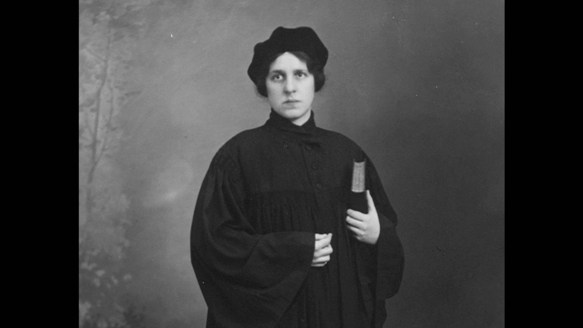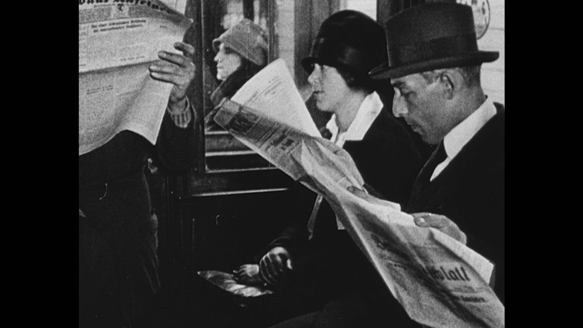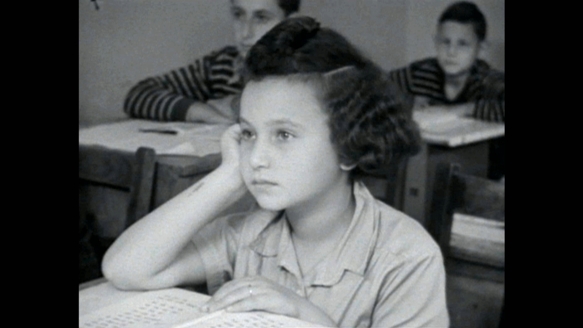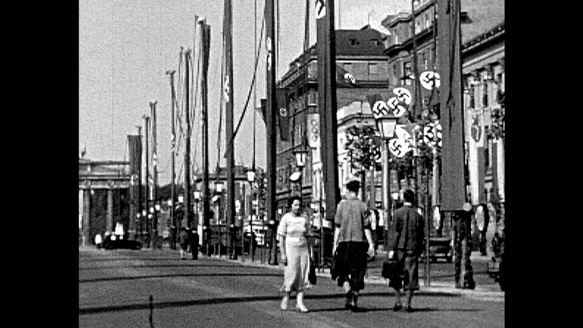Regina Jonas (1902 – 1944) was the first woman to be ordained as a rabbi. One might expect this knowledge to have become part of the Jewish collective consciousness, and Regina a source of inspiration, a leader to emulate, yet she remains an arcane chapter in Jewish history, hidden from view. It is perhaps symbolic that there is only one existing photograph of Regina Jonas.

Yet it is not the mere fact of ordination that makes Regina Jonas memorable. Far more remarkable and deeply moving, is the story one discovers in Regina, a beautifully realized documentary by Diana Groó, that brings Regina Jonas, her life and times to vibrant life onscreen, revealing the intelligence, empathy, strength and determination that made Regina Jonas a spiritual leader. Regina will be shown at the Jerusalem Film Festival as part of The Jewish Experience. Director Diana Groó will be the guest of the festival, on the eve of her departure from Hungary to Jerusalem, Ms. Groó conversed with Midnight East about the making of Regina.
“The project this film idea goes back many years,” said Groó, “actually if I remember, in 2005 I was at the Amsterdam Jewish Film Festival, my first feature film Miracle in Krakow was screened there. A woman rabbi from Frankfurt, Elisa Klapchek, opened the festival and we started to talk… she was the first who mentioned Regina Jonas to me, she liked my first feature and asked me if I wanted to make a film about Regina Jonas. She had just published a book about her at that time (Fraulein Rabbiner Jonas: The Story of the First Woman Rabbi). I was not really interested in the topic as my first feature also had a Jewish topic and I wanted to make something new.”
“Years later (in 2008) I read her book. That was the moment I came to know Regina Jonas. I was very impressed by her short life, her devotion, her faith, but what really impressed me was her character. I was very impressed that she was a brave woman, independently of whether she was the first woman rabbi or not. I felt she was really born to be a rabbi, a religious leader, because of her humanity, regardless of whether she was Jewish or not. That she was Jewish of course that added to the story… she came from an Orthodox family and she made reforms and so on. I think she was kind of person who didn’t care that she’s a reformer, she wanted simply to help people who needed her and she never left them, even though she had the chance to leave Germany at the hardest time. She decided to stay in Germany. I think she was a fantastic person.”
“She was exactly what a leader should be,” said Groó, “and it’s really rare. I was really amazed how she was fighting, how many difficulties she had to face, but at the same time she concentrated on her work. Actually for me it’s not interesting the paper of the ordination, I think she was a rabbi without a paper as well. She was a real rabbi and a real religious leader, it’s proven by the testimonies that I could read from survivors and people who had known her.”
Groó’s film evokes the atmosphere of Berlin in the first half of the 20th century, black and white archival footage, with voice-overs telling the story of Regina Jonas through narration, reading letters and other documents, and giving voice to the memories of those who knew Regina Jonas. As Groó recalls, putting it all together was a challenging task.
“Elisa Klapchek published her book in the late 1990s,” said Groó, “when I read the book I started to research and tried to find all those people with whom she made the interviews, but I couldn’t find anyone alive. So I had to find out how I could recreate the feeling, so that we could hear old ladies in the voice-overs, who would sound like real persons who used to know Regina. I chose for example for one of the voice-overs my grandmother, because regarding her age, she is 86 now, she is a Holocaust survivor and she has of four concentration camps behind her, but regarding her age, if she had lived in Berlin she could have been one of the students of Regina Jonas.”
“At the end when is speaking about how they could survive in the concentration camps, I was 100% sure I don’t want to use actors for the voice-overs. I wanted to use someone who really knows what it is about and my grandmother, although she did not know Regina Jonas, she really knows the meaning of a concentration camp and surviving, and feeling, and talking about this feeling that she also felt at that time at the age of 17. This is the way I re-created the voice-overs, creating somehow the feeling that it is true, casting actors and non-professionals as well to keep this kind of natural, human part of the story.”

In some sense, Groó received much of her information almost directly from Regina Jonas.
“Before her deportation, Regina Jonas (she was deported to Theresienstadt in 1942) collected all her documents,” Groó said, “letters from friends, the official documents about her ordination, including the photo she had, and she went to the Jewish community, to the Centrum Judaicum (The Neue Synagogue) thinking maybe this is a safe place where all these documents can be preserved and they can testify that once upon a time she lived in the world and she made rabbinical work. I think she knew that she would never return. Miraculously her documents survived.”
Yet despite the documentation, the research into Jonas life, the papers and books that have been published since, Regina Jonas remains relatively unknown.
“I think it has different reasons,” Groó reflected, “actually you mentioned Leo Baeck and Viktor Frankl. It’s really interesting because both of them knew Regina Jonas and after they survived they did not talk too much about her. But now at the Leo Baeck College there is a huge photo of Regina Jonas in the college. I don’t know the reason about this silence but I have some thoughts.”
“I know that the ordination of female rabbis is still controversial, it poses many tensions. I know also in Israel, also here in Hungary, we have a woman rabbi (Rabbi Katalin Kelemen), a good friend of mine, actually she’s the first woman rabbi from Central Europe. She has also, very sadly, the same fight with the Jewish community that Regina Jonas had 60 years ago. I think it’s because the Orthodoxy attacks this question very strongly and it’s still questioned if a woman can practice as a rabbi. I think it’s really sad because if someone is really born to be a religious leader, it would be so great if everyone could practice it, regardless of gender. Here in Hungary it’s still a very controversial question.”
Making a movie from a single photograph
“In the beginning,” Groó recalled, “I really didn’t know how this film will come alive because I just realized that in my hand there is only one visual material, the only photo, nothing more, and I have no eyewitnesses alive. I didn’t want to interview rabbis because I didn’t want to focus on the problem of women rabbis. That’s why I didn’t want to make recent interviews. So it was a challenge: how can I make a movie from one single photograph?”

“I started to research the historical period that was her life, from the turn of the century till ’44. I wanted to get all kinds of footage and archival photos regarding social life, cultural life, Jewish life… I used text searches ‘Jewish school in Berlin,’ ‘Jewish girl student,’… and I found out that I want to make a documentary using these archives. We as the audience would see her point of view, and I tried to reconstruct her life through this footage. It was a very, very long process. At the end I had more than 50 hours of archival footage from all around the world and I had to select with my editor the right scenes that fit into her life story. In this footage of course everything was silent, so we had to create a sound atmosphere for the film. it was different work, we had silent pictures in hand, so with the sound engineer we will emphasize the most important noises for atmosphere.”
“It was really hard, and I can tell you some secrets… I really sometimes had difficulties. From the turn of the century I had no close ups about Jewish life in Berlin, I just had footage about the neighborhoods, but without faces. So what could I do? OK, I had the choice, OK I had footage about the buildings and the neighborhood but I would like to have Central European Jewish faces in the neighborhood, as it is in her life. In the quarter where she grew up there were so many Jewish Central European immigrants. I went to Warsaw and Krakow archives and I was looking at close ups of Orthodox Jewish people, and I selected them for my film saying – who knows? Maybe these people from Krakow or Warsaw, they were the families who moved to Berlin? I put these close ups into the Berlin slum atmosphere, so I was playing with these tricks because I really need it. It all fits, and I don’t lie, because who knows, maybe these were the families.”

Making the film took five years. Groó says, “We had many difficulties, at the same time it was a really joyful and exciting process. I live in Hungary, it’s a Nazi country. It was obvious that we cannot get any support from Hungary for this topic, mainly after the changes after the recent government came. We hoped to get money and support that was promised from the previous government, but we never got it. So we were very upset, and it was really difficult to get support, to explain to producers that this film is not about the Holocaust, it’s about surviving. It’s a story during the Holocaust, but this is a very special life story. We cannot deny the time, the Holocaust existed, but this is not a Holocaust film.”
“So it was very difficult to find producers,” Groó recalled, “then, like a miracle, a friend of mine appeared from London – George Weisz, he’s actually the father of Rachel Weisz the actress. George has Hungarian roots, he left Hungary in 1938, luckily, they left for London, so they survived. He’s a good friend of mine and he liked my previous films. He liked this topic and this story, and he supported the film with his foundation, and later German co-producers also joined the production.”
Groó is already working on her next project, which is, as she says, “Unfortunately, again a Jewish topic…but this is my destiny.” Her next film will be based on a historical event, the Tiszaeszlár Affair, a blood libel against the Jews and the ensuing trial and wave of anti-semitism in 1883. These events were re-introduced into the political discourse by Jobbik MP Zsolt Baráth last April.
“People talk about this again,” said Groó, “they said Hungarian people would have to make memory of this poor Christian girl killed 100 years ago…I got so mad last year, I said OK, if Hungarian people really need to know the story, so they will know the real story.”
Regina (UK, Hungary, Germany, 2013, 63 min, English, no subtitles)
Directed by Diana Groó
Screening times: 6.7 at 13:30, Cinematheque 4; 8.7 at 15:00, Cinematheque 4
See the complete list of films screened in The Jewish Experience here.
Links: Regina facebook page





